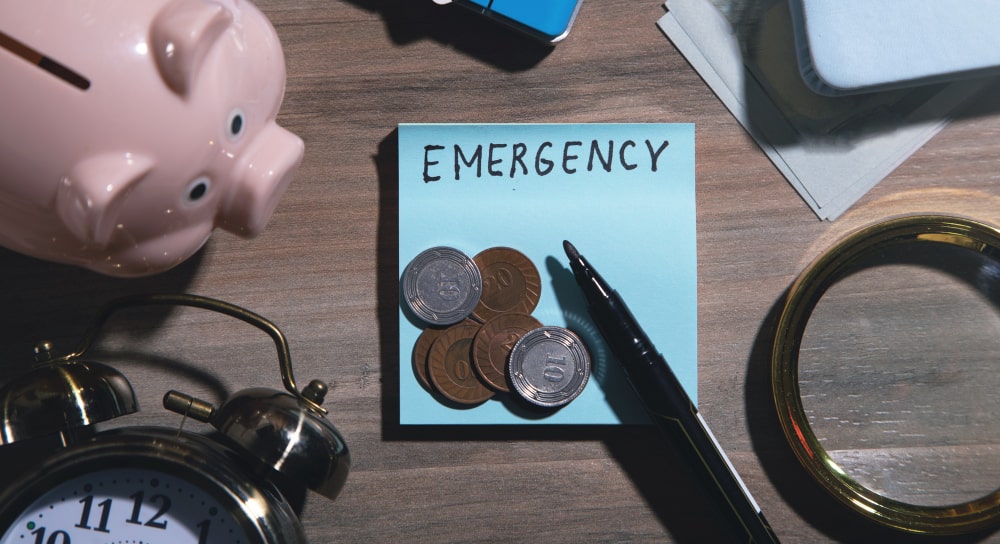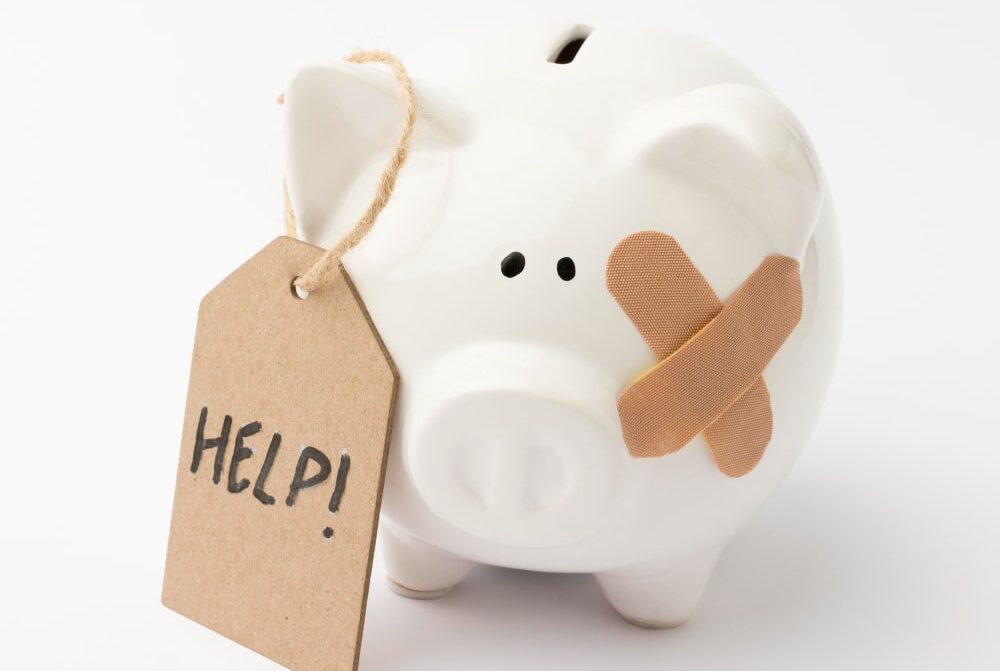6 Emergency Budget
Mistakes To Watch For
Share this content :

When an unexpected situation comes your way, it can be overwhelming. Whether your car breaks down or your working computer malfunctions, you can handle it with an emergency budget. Being prepared and having a plan ahead of time makes you at ease. So don’t worry; let your emergency budget do the work for you!
What is an emergency budget?
Having an emergency budget is like a financial lifeline when things go sideways. Forget the usual spending routine; this one’s all about cutting back to the essentials, the basics that keep you covered. Surely, those unexpected expenses hit hard.
“By nature, unplanned expenses are unexpected, so the sooner you’re prepared, the better off you’ll be when the inevitable happens,” says Greg McBride, CFA, Bankrate’s chief financial analyst.
Without an emergency budget, you might lean on credit cards or loans. But why go there when you can be in control? Let’s tackle the six emergency budget mistakes to watch for and keep your finances solid.

What are the most common emergency budget mistakes?
Once you understand the three principles of financial basics, you’ll be set to handle your expenses and safeguard your financial future.
1. You don’t save enough money.
Without money for an emergency budget, finding yourself in a pinch can quickly become a financial disaster. As a result, you can take out loans with high-interest rates to make ends meet. However, this could also send you into a debt spiral.
Experts recommend that an emergency budget cover up to six months’ expenses. That said, those with irregular income, multiple family members, or start-up businesses might feel safer by saving more.
Find time for new habits and reshape how you think about progress and success. Transform your life with James Clear’s “Atomic Habits.“
2. You save too strictly.
Being overly strict about saving money can lead to exhaustion. Find a savings balance that suits your lifestyle. If you try to save money and deprive yourself of enjoyment, staying committed to your savings plan is challenging.

Begin with a budget, then pinpoint where you can realistically cut back, like skipping takeout for home-cooked meals or hitting thrift stores for clothes. Once you’ve got some extra cash, direct it straight into savings. Smart moves for a solid future.
3. You set an unrealistic budget plan.
Aiming for unrealistic spending or saving goals is one of the most common budgeting mistakes. If you think your expenses are lower than they are, or you believe you can save more than you actually can, your budget needs to make more sense. That messes with your plan to hit your money targets and throws you off track from reaching your financial goals. Keep it real, and stay on the money track!
Suppose you spend 80% of your monthly earnings right now. Now, you decide to cut that down to just 40% of your budget. But here’s the deal: It might be tough to slash your expenses in half suddenly. It’s too big of a change, and you might give up on it. Keep things real and make changes step by step.
Stephen R. Covey shares advice on tackling the biggest personal and professional issues. Imagine learning to handle change and seizing new opportunities. Covey’s “The 7 Habits of Highly Effective People” has steps to live with integrity and strength.
4. You don’t update your budget regularly.
Life’s always changing. As time passes, you’ll have more to handle, like more responsibilities, a bigger family, and maybe even more money. But here’s the thing: if you don’t update your emergency budget to match your life now, you’re making a common mistake. To avoid that, take a look at your emergency budget every year. Ensure it aligns with your current life, income, and stuff you owe.
And here’s an extra tip: After big life moments, such as getting married or becoming a parent, recheck your emergency budget. These events can shake up your financial plans. Changing your emergency budget to fit these changes will help you stay on track and reach your financial goals, no matter where you are.
Can’t keep up with your budget? Watch this video offering 4 budgeting tips to jumpstart your savings. If budgeting is challenging, these practical tips will help you manage your money.
5. You withdraw money for non-essential concerns.
Avoid the temptation of dipping into your emergency budget when discretionary expenses place you over your monthly budget. Holiday shopping and summer getaways are not serious emergencies. If you take money out of your emergency budget for lavish lifestyles, you can run into trouble when a real emergency occurs.
6. You don’t replenish your savings after emergencies.
After an actual emergency, such as costly medical care or car repairs, it is essential to bring back the emergency budget. While recovering, you should start saving money each month for an emergency budget. Rebuilding your finances after having an emergency budget may be easier.

Experts recommend that an emergency budget cover up to six months’ expenses. That said, those with irregular income, multiple family members, or start-up businesses might feel safer by saving more.
Find time for new habits and reshape how you think about progress and success. Transform your life with James Clear’s “Atomic Habits.”
Experts recommend that an emergency budget cover up to six months’ expenses. That said, those with irregular income, multiple family members, or start-up businesses might feel safer by saving more.
Find time for new habits and reshape how you think about progress and success. Transform your life with James Clear’s “Atomic Habits.”
How can I protect my emergency budget?
Now that we understand what financial minimalism is all about let’s dig deeper into the important parts that make it work. Here are three key ideas about financial basics that you can apply daily.

Divide your emergency savings into small, doable goals.
Some financial experts say saving up for 3-6 months worth of expenses is wise. Sounds good, right? But it’s a big goal and can feel overwhelming. As a result, many quit before they even began.
Building savings takes time, so don’t rush. Start small and grow. Some people aim for a huge emergency budget right away, but they realize later that it will take longer. Then, they lose hope and stop trying. Remember, slow and steady wins the race.
Start with a small goal, like $500 or $1,000. That’s enough to cover a car or home repair. If you put away $40 from each paycheck in a year, you’ll have $1,000. Once you’ve reached your goal, aim for something bigger, say $2,000.
Over time, your emergency budget will grow nicely. While you’re at it, be patient and stay positive. Even if you save just $10 a week, that’s over $500 a year. That helps in emergencies. Remember, what matters most is starting, no matter how small, and remaining consistent.
Automate a portion of your salary to go to your emergency budget.
Now that you’ve set up an emergency budget, here’s the next move: Make things easy: set up automatic deposits straight into your savings account. You can do it online or at your bank. Think of your emergency budget like a bill. Add it to your budget and aim to pay into it once a month, just like you would with other bills. When you treat your fund as a bill, you put your money where it counts.

Set up automatic payments for your emergency budget. This way, you won’t have to remember to transfer money and won’t be tempted to use it for other stuff. If it’s not in your checking account, you can’t spend it! The money you put in your fund should fit your budget and match your savings goal. Even a small amount can help you start saving and get into the habit. Think of it like paying yourself first. That’s how you build a solid emergency budget.
Be strict with your monthly expense limit and credit usage.
Once saving has become automatic, don’t think you’re all set and can start spending freely again. For example, if you stopped buying new shoes every month just to create a new shopping habit later, you’re not saving at all! Keep an eye on your spending so you can keep your savings growing. Stay focused and make your money work for you!
If you’ve got an extra $50 each month, your savings might be too low. And if you don’t have that extra $50, you might be raising credit card debt. Neither is a good plan. While building your emergency budget, still enjoy life, but remember how important saving is. Be honest, but push to hit your big savings goal as quickly as possible. That alone can make life even better.
Consider what counts as an emergency.
As your emergency budget grows, use it ONLY for real emergencies. You’ll see those savings pile up nicely. Don’t let the urge to spend it on a vacation or fancy stuff like a big TV get to you. Keep it for real emergencies only. This emergency budget is your safety net, so use it wisely.

It’s called an “emergency budget” for a reason. Don’t use it unless it’s a real emergency. If you keep taking money out, thinking you’ll put it back later, you might start a habit that messes up your progress. Stick to the plan and keep your emergency budget safe and sound.
Disclosure: This article contains affiliate links. Clicking on these links and buying these products may result in us receiving a commission at no additional cost.
Takeaways:
- Knowing the importance of setting aside money for unforeseen expenses and financial stability is necessary.
- An emergency budget acts as a financial lifeline when things go awry, allowing you to cut back on non-essential spending and focus on essentials to unexpected expenses.
- Striking a balance between strict savings and enjoyment is crucial to maintaining a sustainable emergency budget preventing burnout and financial exhaustion.
- To safeguard your emergency budget, avoid common mistakes like setting unrealistic plans, not updating your budget regularly, and withdrawing funds for non-essential expenses.
Share this content :
Copyright © 2023 Munif Ali. All rights reserved.

